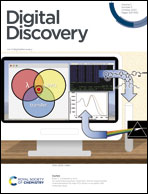Interpretable models for extrapolation in scientific machine learning†
Abstract
Data-driven models are central to scientific discovery. In efforts to achieve state-of-the-art model accuracy, researchers are employing increasingly complex machine learning algorithms that often outperform simple regressions in interpolative settings (e.g. random k-fold cross-validation) but suffer from poor extrapolation performance, portability, and human interpretability, which limits their potential for facilitating novel scientific insight. Here we examine the trade-off between model performance and interpretability across a broad range of science and engineering problems with an emphasis on materials science datasets. We compare the performance of black box random forest and neural network machine learning algorithms to that of single-feature linear regressions which are fitted using interpretable input features discovered by a simple random search algorithm. For interpolation problems, the average prediction errors of linear regressions were twice as high as those of black box models. Remarkably, when prediction tasks required extrapolation, linear models yielded average error only 5% higher than that of black box models, and outperformed black box models in roughly 40% of the tested prediction tasks, which suggests that they may be desirable over complex algorithms in many extrapolation problems because of their superior interpretability, computational overhead, and ease of use. The results challenge the common assumption that extrapolative models for scientific machine learning are constrained by an inherent trade-off between performance and interpretability.



 Please wait while we load your content...
Please wait while we load your content...